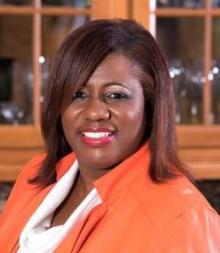
He's chairman of the Broward Democratic Party, a frequent guest analyst on national network news shows, a consummate party man who had been re-elected chairman repeatedly since the 1990s in contentious races against serious opponents.
Yet somehow, in some perfect storm of voter obstinance in an establishment-humbug year -- and machinations beyond even his control -- Mitch Ceasar lost his bid in August to become the Broward County clerk of court.
Not only did Caesar lose, he was beaten by Brenda Forman, a candidate from out in left field somewhere. A candidate few voters except her husband, the current clerk of court, had ever heard of before the campaign. In fact, her husband was her only "name" endorsement.
And it wasn't even close: She won by more than 13 points. There are 578,674 Democrats registered to vote in Broward County. Only 116,000 of them voted in the clerk's race. Forman got 43.79 percent of the vote, Ceasar 30.10 percent and Elizabeth Ann McHugh, 26.11 percent.
The smart money was always on Ceasar.
 Ceasar is more than county party chairman. He serves on the Executive Board of the Democratic National Committee, representing the 14 southern states. He has given his time as chairman of the Sawgrass Expressway, served on the Civil Rights Committee of the Anti-Defamation League, and was the chairman of the Broward County Education, Research and Training Authority whose sole purpose was the creation of real jobs through funding incentives.
Ceasar is more than county party chairman. He serves on the Executive Board of the Democratic National Committee, representing the 14 southern states. He has given his time as chairman of the Sawgrass Expressway, served on the Civil Rights Committee of the Anti-Defamation League, and was the chairman of the Broward County Education, Research and Training Authority whose sole purpose was the creation of real jobs through funding incentives.
Maybe that was his problem. Maybe he was too "establishment" in a non-establishment year.
With nationwide Democratic and business contacts, Ceasar -- still a practicing attorney -- always had the advantage in raising money. By Aug. 30, he had hauled in $260,045, more than twice as much as nearest opponent McHugh, administrative director at the Broward Public Defender's Office, with $105,358 -- and nearly six times winner Brenda Forman's $43,500.

"No one, and I do mean no one, gave Brenda a snowball's chance in hell of winning," said Democratic African American Women's Caucus founder Leslie Wimes. "No one wanted to donate to her campaign. She couldn't get any endorsements. (U.S. Rep.) Alcee Hastings disrespected her during a Black History ceremony in Broward County and sang the praises of Mitch Ceasar in her face."
Kyle Gardiner, an independent broker from Hollywood who told Sunshine State News on Friday, "The results shocked me. We're all kind of still talking about it. I don't know Mitch Ceasar personally, but I know his reputation. I'm pretty sure he could run that office which is why I voted for him.
Fort Lauderdale elementary school teacher Annie Hayman told me, "I haven't talked to anybody who thinks Brenda Forman is qualified for the job."
And lest we forget that Broward County is larger in population than seven states ... consider how big the clerk-of-court job really is:
The clerk oversees more than 800 employees who are responsible for the day-to-day business operations of the courthouse and satellite offices. That includes running an office which handles thousands of court documents, collects fines, conducts civil marriages and takes passport applications. The clerk's pay? Roughly $165,000-plus annually and a huge -- probably a too huge -- pension.
The annual budget for the office is roughly $38 million, but that figure is down from previous years, which has forced the office to cut 100 employees, institute furloughs and reduce hours of operation. Howard Forman recently sued the state Legislature to get some of that money back, accusing lawmakers of reneging on their duty to adequately fund the system. Brenda Forman likely will have to see that lawsuit through.
How did Forman pull it off? And how did Ceasar lose an election in a county where he is king?
Forman's resume is scant. It lists a lifetime of jobs, but not always the length of time she spent doing them, or the responsibilities involved. She worked in the Clerk of Court's Office from 2011-2013, where she and her husband met. She served in the Traffic and Misdemeanor Division, basically as a clerk/secretary until they married in 2013.
When I asked her if she felt she was qualified to run such a complex office, she said, "If I didn't think I could do the job, I wouldn't have gotten in the race.
"Actually, I'm the only one running who was qualified, because I'm the only one who worked in that office."
I asked her if she had any experience supervising a large staff. She said, "I owned my own mortgage company for five years and I've been a licensed Realtor for 10."
But when I asked about her education, if she had a diploma from the high school she lists on her resume, Charles Henderson High School in Troy, Ala., she ended the interview. "You are insulting me," she said.
I had other questions for her, particularly about financial irregularities and missteps in her background, both personally and professionally. But we didn't get that far.
Which made me realize:
All of us in the media charged with keeping voters informed about candidates -- myself included -- shouldn't feel good about asking a candidate questions like this after the election. What good have we been here? What good is this information now?
Reaching Ceasar on Friday, I was greeted with unrelenting optimism.
"Sure I wanted to win, and I know the outcome shocked a lot of people," he said. "But I made a decision I was not going to run a negative campaign, that's how I'm comfortable, and that's why I didn't.
"I'm the chairman of the Broward Democratic Party. I knew, win or lose, a negative campaign could have turnout repercussions in November. And I didn't want to do anything to hurt Hillary Clinton. She's more important than little Mitch Ceasar. (Donald) Trump is crazy, America needs Hillary to win this election."
Ceasar said he might have been a victim of the brutal Tim Canova-Debbie Wasserman Schultz campaign.
"I won all the precincts where super voters were out there," he said. "But the Canova-DWS race produced tens of thousands of voters who had never come out before. I think that hurt me."
In fact, a source close to the office of Elections Supervisor Brenda Snipes said in confidence, "Supervisor Snipes reduced the number of early voting days from nine to five so that she had extra money to increase an absentee ballot push."
And a South Florida political operative who asked not to be identified told me "ballot brokering" ran amok in the weeks leading up to Aug. 30. "That's why you saw so many ballots submitted by mail." The practice is illegal.
Brokers get paid to circulate mail-in ballots. In Broward this election, 78,708 ballots came in by mail; 43,165 through early voting; and 67,775 on voting day. Candidates paid brokers to circulate a stack of ballots, help voters decide who to vote for and get a signature.
"This works very well in neighborhoods where illiteracy is high and English isn't spoken so well," he said.
I asked Ceasar if this race will finish his political career. After all, he didn't just lose a race. In a very real sense he lost his political life.
He took a leave of absence last year to run for the clerk position and had said he would return after the primary through the Nov. 8 election. Which is good for the Democrats. He's got a lot of work to do to ramp up voter turnout in the county. Broward recorded the lowest August turnout of all 67 Florida counties.
But Ceasar didn't run for precinct committeeman, so that means he can't run for the chair position in December. Just like that he has lost his standing with the DNC, without any political alternative.
Said Ceasar, "Look, I've been fighting for progressive ideas for 40 years, I don't intend to stop now. I think bringing in a new chairman is a good thing. It's time to cleanse the system.
"To me, the most important thing right now is getting Hillary elected. I've disagreed with Republican candidates before but they've never scared me. Donald Trump scares me, he scares the world. I'll worry about that first and my next fight after November."
Reach Nancy Smith at nsmith@sunshinestatenews.com or at 228-282-2423. Twitter: @NancyLBSmith



